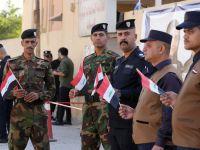The Middle East peace process headed for a lengthy stalemate Tuesday amid political maneuvering in Israel and continuing violence in the Palestinian territories.
Israeli Prime Minister Ehud Barak prepared to meet opposition Likud leader Ariel Sharon for a new round of talks on forming an emergency national government with the right.
But Sharon's demands, including an effective veto on new peace negotiations with the Palestinians, appeared to be a sticking point.
Barak met earlier Tuesday with the leaders of other potential allies of different persuasions before seeing Sharon.
The powerful Orthodox Jewish Shas party, the third largest in parliament, said late Monday, however, that it would not return to a government headed by Barak, though it would support a broad coalition from outside.
Barak, without a parliamentary majority for more than three months, wants to put together a new government before parliament reopens on October 30 with a bill for early elections high on the agenda.
He has paid no heed to critics, even within his own cabinet, which suggested Sharon's inclusion in an enlarged government would signal the death knell for the seven-year-old peace process.
Former Prime Minister Benjamin Netanyahu, Sharon's predecessor as Likud leader, said his party should join a national government, "but it should be for a limited time and a date should be fixed for elections."
"As soon as the danger posed by the Arab violence has passed, the people have to be allowed to choose between the path of continual concessions and our way, based on deterrence," he said.
Meanwhile, with "time out" called on the peace process by Barak following last weekend's critical Arab summit, the army said it was gearing for a prolonged struggle with the Palestinians.
"The army is preparing for a long campaign with our Palestinian neighbors, as the confrontations are not going to end from one day to the next," Israeli army spokesman General Ron Kitrey told public radio.
The daily Haaretz quoted chief of staff General Shaul Mofaz as predicting at a meeting of service chiefs that the clashes, which have killed more than 130 people, all but eight of them Arabs, in less than four weeks, would last at least a year.
Seven Palestinians were wounded, one seriously, Tuesday when youths clashed with Israeli troops near Rafah in the south of the Gaza Strip, hospital sources said, while a 13-year-old died of wounds sustained Saturday.
The army called on the Palestinian Authority to ban schoolchildren from participating in confrontations with the military, following the closure of schools to celebrate a Muslim holy day.
The fighting was sparked by a visit by Sharon to the Al-Aqsa mosque area in east Jerusalem, which is sacred to Jews as well as Muslims and is the centre of a bitter dispute over sovereignty.
Mofaz also predicted more clashes on the border with Lebanon, but said the risk of a regional conflict was slight, Haaretz said.
Egyptian Foreign Minister Amr Mussa told the Lebanese daily As-Safir that "the peace process as we have known it is finished because of the attitude of Israel towards the Intifada (Palestinian uprising)."
"We should not succumb to any pressure and we should not go back to the mechanism of previous negotiations under any pretext," he added.
"Nobody among the Arabs and Palestinians will accept a return to the negotiating table under the same terms as before," said Mussa.
"The priority now must be to support the Palestinian people and their resistance to Israeli occupation and to establish new ground rules before embarking on a new round of negotiations," the foreign minister said.
Meanwhile the United States put its forces in the Gulf on heightened alert "in response to specific information" regarding feared terrorist attacks, US officials said.
According to CNN, US forces in Bahrain, Qatar and at the Incirlik base in southeast Turkey, used by the planes that patrol a no-fly zone over northern Iraq, were placed on the highest possible state of alert.
The move was prompted by "terrorist threats" believed to have been made by associates of suspected terrorist mastermind Osama bin Laden, the television network reported.
The New York Times added Saudi Arabia to the list of countries where US forces have been placed on "delta" alert, meaning they must prepare for imminent attack.
"Local commanders have the right and the responsibility to set appropriate threat conditions based on information that they have," a US defense official said.
US investigators are pressing on with their probe of the suspected suicide attack on the US Navy destroyer Cole that killed 17 sailors and injured 38 others in the southern Yemeni port of Aden on October 12 -- JERUSALEM (AFP)
© 2000 Al Bawaba (www.albawaba.com)







